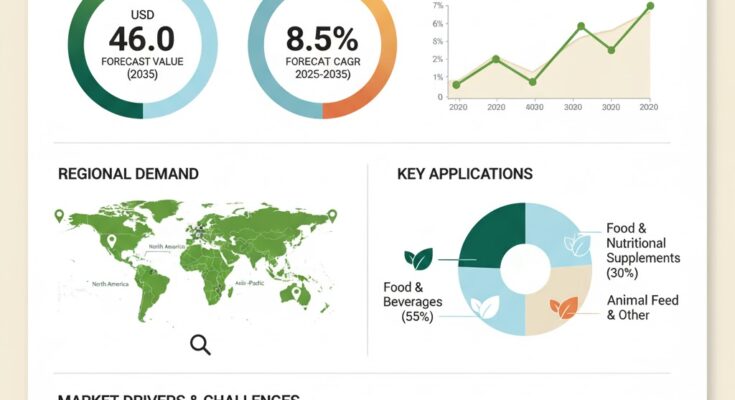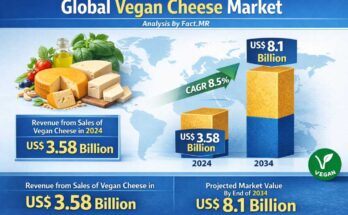The global plant protein ingredients market is on an accelerated growth trajectory, driven by increasing consumer inclination toward sustainable, health-focused, and eco-friendly dietary options. According to a recent report by Fact.MR, the market is projected to expand from USD 20.3 billion in 2025 to approximately USD 46.0 billion by 2035, marking an absolute increase of USD 25.7 billion during the forecast period. This translates into a total growth of 126.6%, with the market forecast to expand at a compound annual growth rate (CAGR) of 8.5% between 2025 and 2035.
As plant-based diets become mainstream across food, beverage, and nutraceutical industries, manufacturers are innovating with high-quality, functional protein ingredients derived from sources like soy, pea, wheat, and rice. The industry’s rapid expansion reflects a global shift toward sustainability, animal welfare, and clean-label nutrition.
Strategic Market Drivers
Rising Consumer Preference for Plant-based Nutrition
Consumers are increasingly seeking protein-rich alternatives to animal-based products, motivated by health benefits, ethical considerations, and environmental sustainability. This shift has led to widespread use of plant protein ingredients in meat substitutes, dairy alternatives, and sports nutrition products. The growing vegan and flexitarian populations worldwide continue to propel market expansion.
Sustainability and Environmental Impact Reduction
Plant proteins offer a significantly lower carbon footprint compared to traditional animal proteins. Food producers are aligning with global sustainability targets by adopting plant-based formulations that reduce greenhouse gas emissions and land use. Companies are emphasizing traceable and renewable sourcing to appeal to eco-conscious consumers.
Technological Innovations in Protein Extraction and Processing
Advancements in extraction and texturization technologies have improved the taste, solubility, and functionality of plant proteins. Innovations such as enzyme-assisted extraction and fermentation-based protein enhancement are enabling manufacturers to develop superior-quality products suitable for diverse applications—from ready-to-drink beverages to baked goods.
Growing Application Spectrum Across Industries
The versatility of plant protein ingredients extends beyond food and beverages. Increasing integration in nutraceuticals, animal feed, and personal care formulations underscores their broad functional and nutritional value. As consumers demand transparency and clean-label ingredients, plant protein formulations are becoming an integral part of next-generation product development.
Regional Growth Highlights
North America: Leading the Plant-based Revolution
North America remains at the forefront of the plant protein movement, driven by strong consumer awareness, innovation in alternative protein foods, and proactive investment in sustainable production technologies. The U.S. and Canada continue to dominate demand, supported by robust retail and foodservice adoption of plant-based products.
Europe: Regulation-driven Growth and Clean-label Momentum
Europe’s strict regulations promoting sustainable agriculture and reduced carbon emissions are propelling plant protein adoption. Countries like Germany, the U.K., and the Netherlands are witnessing strong growth in meat alternatives, with consumers prioritizing natural, allergen-free, and traceable protein ingredients.
East Asia: Emerging as a High-potential Market
East Asia’s growing middle-class population, evolving dietary habits, and rapid industrialization in food manufacturing are fostering demand for plant protein ingredients. China and Japan are investing heavily in domestic production and R&D to cater to the rising demand for fortified and functional food products.
Latin America and the Middle East: Untapped Market Opportunities
Emerging economies are showing increasing potential due to expanding food processing industries, rising health awareness, and government initiatives promoting sustainable nutrition. Regional manufacturers are diversifying product portfolios to include plant-based protein ingredients compatible with local culinary preferences.
Market Segmentation Insights
By Source
- Soy Protein: Dominates the market due to its high protein content, availability, and established industrial use.
- Pea Protein: Experiencing robust growth as a clean-label, allergen-free alternative.
- Wheat and Rice Proteins: Gaining traction in specialized applications like bakery and beverages.
By Application
- Food & Beverages: Largest segment, including dairy alternatives, meat substitutes, and nutritional bars.
- Nutraceuticals: Rising demand for plant-based protein powders and supplements.
- Animal Feed and Pet Nutrition: Growing integration to support sustainable feed formulations.
By Form
- Isolates: High purity and protein concentration, ideal for performance nutrition and fortified foods.
- Concentrates: Cost-effective solutions widely used in processed foods.
- Textured Proteins: Crucial in replicating meat-like textures for alternative protein products.
Competitive Landscape
The global plant protein ingredients market is characterized by innovation, strategic partnerships, and strong investment in technology and sustainability.
Key Players in the Plant Protein Ingredients Market:
- Ingredion Incorporated
- Cargill
- DuPont
- Roquette
- ADM
- Axiom Foods
- Kerry Group
- Puris Proteins
- Burcon NutraScience
- The Scoular Company
Leading companies are focusing on expanding product portfolios, improving extraction efficiency, and developing specialty proteins with enhanced sensory and nutritional properties. Mergers, acquisitions, and collaborations with food manufacturers are common strategies to strengthen market presence and accelerate innovation.
Future Outlook: Shaping the Protein Economy of Tomorrow
The decade ahead marks a transformative phase for the plant protein ingredients industry. As global consumers embrace sustainable living and ethical consumption, plant-based proteins will continue to disrupt traditional food systems. Manufacturers that successfully blend innovation, sustainability, and scalability will lead the next wave of growth.
Maufracture is positioned to be a key enabler of this evolution—delivering high-quality, sustainable, and performance-driven plant protein ingredients that align with the world’s transition toward a healthier, greener, and more resilient food ecosystem.



